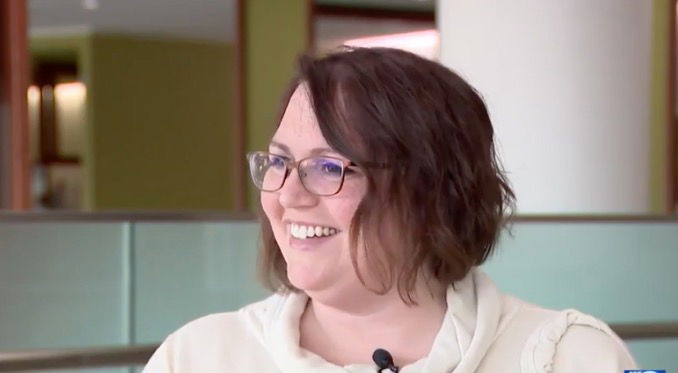Woman undergoes ‘life-changing’ procedure years after epilepsy diagnosis

Epilepsy is the most common chronic brain disease
By Kristin Pierce
Click here for updates on this story
MILWAUKEE (WISN) — Epilepsy is the most common chronic brain disease, with nearly 3 million adults in the U.S. diagnosed. Epilepsy can be disruptive, dangerous and terrifying.
But, there is a way for those with epilepsy to lessen their seizures or stop them completely.
Wendy Buch is one of those people. She is able to drive again, go hiking and swimming. These are things the mom of two stopped doing after being diagnosed with epilepsy.
“I was getting my hair done, and I woke up in an ambulance,” Buch said.
At the age of 42, Buch had her first seizure. A week later, another one.
“No memory of anything happening,” Buch said. “I didn’t feel anything.”
Wendy saw a neurologist shortly after. The doctor looked for tumors and lesions, but the MRI found nothing.
She worked with a team in Appleton near where she lives before being transferred to a specialist at Froedtert and the Medical College of Wisconsin, which has a nationally recognized neurosciences team, offering a world-class resource for complex neurological disorders.
Buch was diagnosed with adult onset epilepsy.
Epilepsy is a chronic brain disorder that causes seizures, which are uncontrolled bursts of electrical activities that change sensations, behaviors, awareness and muscle movements. Anyone of any age can develop epilepsy.
“It was very surprising. I assumed it was something that I was doing,” Buch said. “It was scary with that diagnosis.”
Buch and her family’s life changed. Daily tasks like driving she could no longer do. Her teenage twins stepped up and helped their mom.
“My husband and my children had to learn how to work with me,” Buch said.
At one point, Buch averaged about six seizures a month. Sometimes, she had multiple seizures in one day.
“It was a lot. It was a lot to take on,” Buch said.
This was Buch’s life for four years until professor of neurosurgery Dr. Sean Lew recommended the responsive neurostimulation procedure, or RNS.
“For epilepsy surgery, traditionally, the treatment is to find the part of the brain causing seizures and removing that part of the brain,” Lew said. “The problem with that approach is that for some people you can’t remove that part of the brain because it’s too important for function.”
RNS is an option for those patients.
Doctors implant a stimulator that’s constantly detecting seizure activity. The device, about the size of a match box, works to cut down on the number of seizures patients experience or stop them all together.
“We know that the real improvement of quality of life comes with being seizure-free or near seizure free and when that happens, it’s extremely gratifying for the patient, it’s gratifying for us,” Lew said.
The stimulator sits in the skull. It’s connected to two electrodes in the brain, or on the surface of the brain.
“It’s a big deal because it’s really made almost everybody a candidate for epilepsy surgery,” Lew said.
The batteries typically last between six and 10 years. Buch is within year one and already feeling the difference.
“Talking with my neurologist, he can see all of that data and he can see that there’s activity where the device kicked in and say, ‘Hey, something’s happening here’ and stopped it. I cannot feel that,” Buch said.
Buch said she went from having at least one seizure a week to having three seizures in months. She calls the procedure life-changing.
Buch, now 47, is able to hike, go swimming and drive again. Things she could not do for years.
“I’m just so thankful. I’m thankful for not having those seizures, to not have that in my life anymore,” Buch said.
Lew said epilepsy patients should start with medication before trying surgery. He stressed that epilepsy surgery is safer than most people think.
Please note: This content carries a strict local market embargo. If you share the same market as the contributor of this article, you may not use it on any platform.